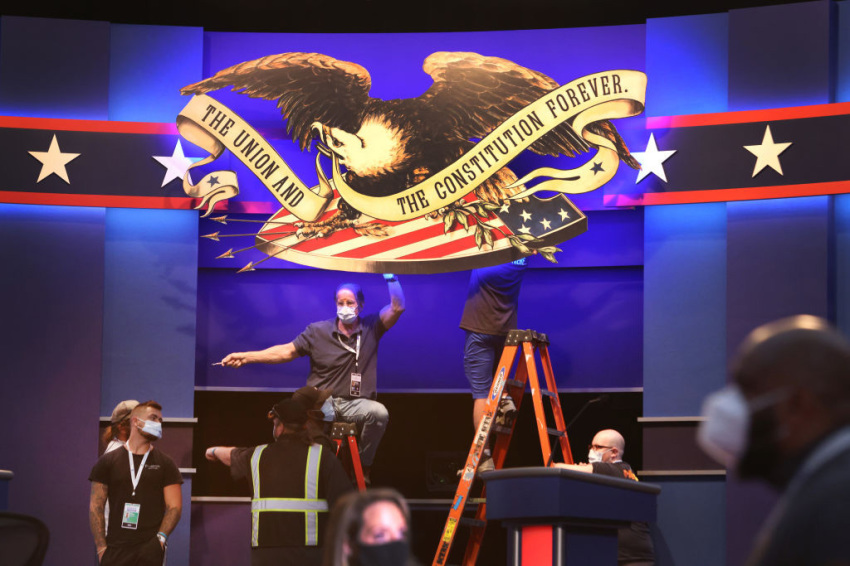Trump v. Biden first 2020 presidential debate: Here's what to expect

President Donald Trump and former Vice President Joe Biden will face off tonight in the first of three presidential debates ahead of the election on Nov. 3.
The first debate, taking place at Case Western Reserve University in Cleveland, Ohio, will be moderated by "Fox News Sunday" host Chris Wallace and will consist of six 15-minute segments.
Wallace announced the topics for the debate last week. The candidates will be asked about their respective records, the Supreme Court, the novel coronavirus, the economy, race and violence in American cities, and the integrity of the election.
Fox News producer Pat Ward said Tuesday that during negotiations for the first debate the Biden campaign requested two 30-minute breaks, which was turned down by the Trump campaign. For its part, the Trump campaign asked that a third party inspect debaters' ears for electronic devices or transmitters. While Trump consented to the inspection, Biden reversed his decision.
Ward said on Twitter Tuesday afternoon: “Joe Biden’s handlers several days ago agreed to a pre-debate inspection for electronic earpieces but today abruptly reversed themselves and declined." Trump had also demanded that both he and Biden take a drug test before or after the debate.
Due to COVID-19, the first debate will not have many of the characteristics viewers typically associate with presidential face-offs. According to Politico, “the two sides have decided to forego the traditional pre-debate handshake in light of the virus.”
Rather than a large audience filled with supporters of both candidates, the debate will feature a scaled-back audience with 75 to 80 people, all of whom will undergo testing for coronavirus beforehand. In addition, the traditional post-debate spin room will go by the wayside in light of the pandemic.
Other than the aforementioned modifications, the evening will proceed much like debates have in the past. Neither candidate nor Wallace will wear a mask and a coin toss determined who will receive the first question. Trump won the coin toss. Mirroring the two candidates’ positions on the ideological spectrum, Trump will stand on the right and Biden will stand on the left.
Recent news stories will almost certainly come up at the debate, even if they are not brought up by the moderator. The New York Times report about Trump's taxes and a Senate report detailing “millions of questionable transactions” between Biden’s son, Hunter, and foreign associates are two examples of stories that broke in the past week after Wallace had already selected debate topics.
Leading up to the debate, there was much discussion as to whether Biden should show up. Many big names in the Democratic Party, including House Speaker Nancy Pelosi, have argued that the Democratic nominee should not debate the president.
Pelosi cited her opinion that Trump has not “comported himself in a way that anybody should” and has no “association with truth, evidence, data and facts” as the justification for why Biden should refuse to debate him. Joe Lockhart, a CNN commentator who was a press secretary for former President Bill Clinton, made a similar argument, proclaiming that Biden should not give his opponent an opportunity to “take the truth and destroy it.”
Trump’s team had called for an additional presidential debate at the beginning of September since many states have already begun early voting. Biden, however, did not agree to a fourth debate ahead of early voting.
In the past, the most memorable debate moments are often those that caught one of the candidates by surprise. In 2000, Democratic nominee Al Gore awkwardly stood up and walked toward his Republican opponent, future President George W. Bush, as he answered a question at a town hall-style debate. Bush nodded at Gore as the audience laughed in amusement.
In 2016, Hillary Clinton brought up Trump’s past statements about former Miss Universe Alicia Machado, leading the candidate to go on the defensive about his comments for days following the debate. Presidential debates can change the narrative of a race for multiple days and sometimes, they can irreversibly change voters’ perceptions of political candidates.
In a 1988 presidential debate, Democratic nominee Michael Dukakis gave a response to a hypothetical question asking whether he would support the death penalty if his wife was raped and murdered that many saw as emotionless. NBC News later described the candidate’s response as “the debate answer that ruined Michael Dukakis in 1988.”
Shortly after the debate, Dukakis lost to Republican George H.W. Bush, the most recent candidate to win more than 400 electoral votes. Four years later, one of the debates reflected negatively on Bush the senior, who checked his watch as if he did not want to be there and struggled to answer an audience member’s question. That fall, George H.W. Bush became the most recent incumbent president to lose reelection.
In 2016, the most noteworthy debate moment came when Trump refused to definitively say that he would accept the results of the election. His opponent, Hillary Clinton, described Trump’s response as “horrifying.” However, following that election, it was Clinton who did not accept the election results.
The first presidential debate of 2020 is expected to boast a large audience, with a Monmouth Poll finding that 74% of voters are planning on tuning in. The debate will broadcast on Fox News at 9 p.m. Eastern time and will last for 90 minutes.
Following a vice presidential debate in Salt Lake City next week, Trump and Biden will debate in Nashville, Tennessee, on Oct. 15 and in Miami, Florida, on Oct. 22.



























